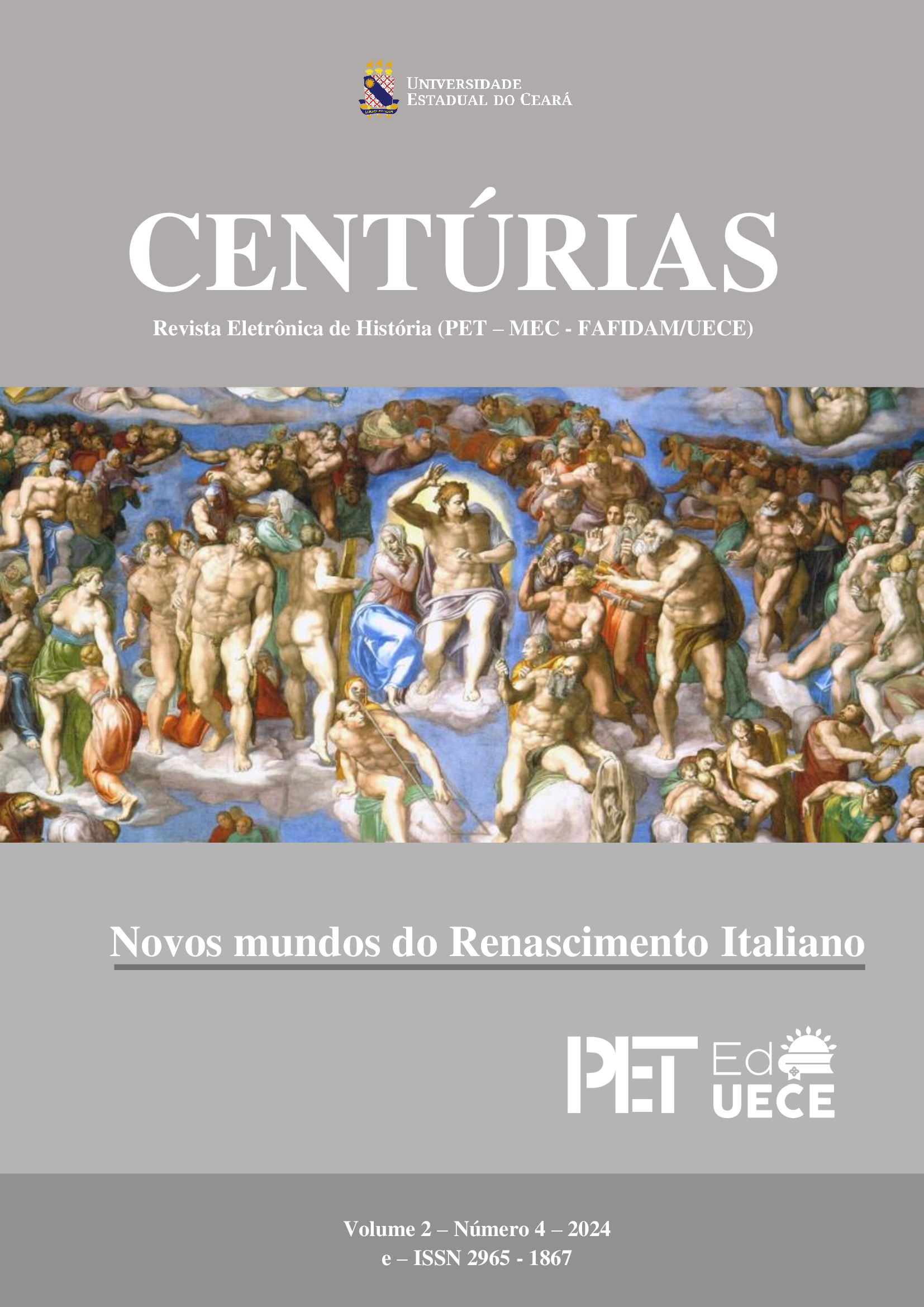SOBRE A RELAÇÃO ENTRE HISTÓRIA E LITERATURA E O ROMANCE MULHERES EMPILHADAS (2019)
DOI:
https://doi.org/10.52521/rc.v2i4.12550Palabras clave:
História. Literatura. Mulheres Empilhadas. Feminicídio.Resumen
O presente trabalho se propõe a estudar, a partir de uma análise teórico-conceitual, as intersecções e confluências existentes entre as disciplinas de História e Letras observando, em um primeiro momento, como essa complexa relação se deu ao longo do tempo e algumas das transformações pelas quais passou. Já em um segundo momento do trabalho discute-se alguns trechos do romance Mulheres Empilhadas (2019) pensando os diferentes aspectos e momentos da obra em que a relação entre a literatura e o conhecimento histórico se evidencia. A partir disso notamos que o diálogo entre as citadas áreas e os possíveis usos articulados sobre isso na escrita do romance em questão torna possível que reflitamos criticamente, a partir do ficcional, questões e problemáticas históricas e sociais como, por exemplo, o feminicídio. Para tal, estabelecemos um diálogo com Biroli (2014), Llosa (2002), Ferreira (2009), Barros (2010), Silva e Santos (2021), Vago (2021), dentre outros autores.
Citas
AZEVEDO, Luciene. A ficção e o documento: uma leitura de Mulheres Empilhadas de Patrícia Melo e de Garotas Mortas de Selva Almada. Matraga, Rio de Janeiro, v. 28, n. 52, p. 113-127, jan./abr. 2021. Disponível em: https://www.e- publicacoes.uerj.br/index.php/matraga/article/view/53201/36888. Acesso em: 24 jun. 2023.
BARROS, José D’Assunção. História e Literatura – novas relações para novos tempos. Contemporâneos: Revista de Artes e Humanidades, n. 6, p. 1-27, mai./out. 2010. Disponível em: https://www.revistacontemporaneos.com.br/n6/dossie2_historia.pdf. Acesso em: 01 dez. 2022.
BIROLI, Flávia. O público e o Privado. In: MIGUEL, Luis Felipe; BIROLI, Flávia. Feminismo e política: uma introdução. São Paulo: Boitempo, 2014. p. 31-46.
BLOCH, Marc Leopold Benjamin. Apologia da história, ou, O ofício de historiador. Rio de Janeiro: Zahar, 2001.
FERREIRA, Antonio Celso. A fonte fecunda. In: PINSKY, Carla Bassanezi; LUCA, Tania Regina de. O historiador e suas fontes. São Paulo: Contexto, 2009. p. 61-92.
FIORIN, José Luiz. Linguagem e Interdisciplinaridade. Alea: Estudos Neolatinos, Rio de Janeiro,
v. 10, n. 1, p. 29-53, jan./jun. 2008. Disponível em: https://www.scielo.br/j/alea/a/nTDjhCdwBqjsFGYct5ckdcd/?format=pdf&lang=pt. Acesso em: 07 nov. 2022.
LIMA, Luiz Costa. História e literatura: panorama crítico. In: IEGELSKI, Francine; SCHITTINO, Renata (Orgs.). Teoria da História Hoje: historiografia e sentido histórico. Niterói: PPGH/UFF Usina Editorial, 2022. p. 94-104.
LLOSA, Mario Vargas. La Verdad de las Mentiras. Madrid: Alfaguara, 2002. MELO, Patrícia. Mulheres Empilhadas. São Paulo: LeYa, 2019.
MORIN, Edgar. A cabeça bem feita: repensar a reforma, reformar o pensamento. 8ª ed. Rio de Janeiro: Bertrand Brasil, 2003.
OLINTO, Heidrun Krieger. Novas sensibilidades na historiografia (literária). Itinerários, Araraquara, n. 22, p. 1-14, 2004. Disponível em:
https://periodicos.fclar.unesp.br/itinerarios/article/view/2735/2471. Acesso em: 14 abr. 2023.
RICOEUR, Paul. Tempo e Narrativa – Volume 1: A intriga e a narrativa histórica. São Paulo: WMF Martins Fontes, 2010.
SAFFIOTI, Heleieth I. B. Violência de Gênero no Brasil atual. Revista Estudos Feministas, Florianópolis, nº especial, 2º sem. 1994. Disponível em: https://periodicos.ufsc.br/index.php/ref/article/view/16177/14728. Acesso em: 21 jul. 2023.
SILVA, Rafaela Mendes da; SANTOS, Francisco Wilton Moreira dos. História e Literatura: Jorge Amado, seus romances e as questões históricas nos anos 1930. Escritas do Tempo, Marabá, v. 3,
n. 8, p. 206-224, mai./ago. 2021. Disponível em: https://periodicos.unifesspa.edu.br/index.php/escritasdotempo/article/view/1558/675. Acesso em: 24 jun. 2023.
THOMPSON, Edward Palmer. A Miséria da Teoria ou um planetário de erros. Uma crítica ao pensamento de Althusser. Rio de Janeiro: Zahar Editores, 1981.
VAGO, Natália Barbosa Gomes. Quando a Arte imita a Vida: Feminicídio em Mulheres Empilhadas. 2021, 99 f. Dissertação (Mestrado em Estudos de Literatura) – Programa de Pós- Graduação em Estudos de Literatura, Universidade Federal Fluminense, Niterói, 2021. Disponível em: https://app.uff.br/riuff;/bitstream/handle/1/24857/NATÁLIA%20VAGO%20-
%20QUANDO%20A%20ARTE%20IMITA%20A%20VIDA.pdf?sequence=1&isAllowed=y. Acesso em: 24 jun. 2023.
Descargas
Publicado
Cómo citar
Número
Sección
Licencia
Derechos de autor 2024 Antônio Wesley do Nascimento Martins, Jamile Pinheiro da Silva, Edmilson Alves Maia Júnior

Esta obra está bajo una licencia internacional Creative Commons Atribución 4.0.








